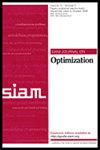随机零阶优化中的小误差是虚构的
IF 2.3
1区 数学
Q1 MATHEMATICS, APPLIED
引用次数: 0
摘要
SIAM 优化期刊》,第 34 卷第 3 期,第 2638-2670 页,2024 年 9 月。 摘要大多数零阶优化算法模仿一阶算法,但用一些梯度估计器代替目标函数的梯度。这种估计器是随机构建的,其期望值与目标函数平滑近似值的梯度相匹配,而目标函数平滑近似值的质量会随着基本平滑参数[数学]的降低而提高。从计算角度来看,需要较少函数评估次数的梯度估计器更为可取。虽然可以利用向量微积分中的发散定理获得基于单次函数求值的估计值,但当[math]趋近于 0 时,估计值的方差会爆炸性增长。由于这种估计器只需要一次函数评估,因此不会被抵消。此外,当[math]趋于 0 时,它的方差仍然是有界的。我们证明,使用我们的估计器的零阶算法能提供与最先进方法相同的理论收敛保证。然而,数值实验表明,它们在实践中的收敛速度往往更快。本文章由计算机程序翻译,如有差异,请以英文原文为准。
Small Errors in Random Zeroth-Order Optimization Are Imaginary
SIAM Journal on Optimization, Volume 34, Issue 3, Page 2638-2670, September 2024.
Abstract. Most zeroth-order optimization algorithms mimic a first-order algorithm but replace the gradient of the objective function with some gradient estimator that can be computed from a small number of function evaluations. This estimator is constructed randomly, and its expectation matches the gradient of a smooth approximation of the objective function whose quality improves as the underlying smoothing parameter [math] is reduced. Gradient estimators requiring a smaller number of function evaluations are preferable from a computational point of view. While estimators based on a single function evaluation can be obtained by use of the divergence theorem from vector calculus, their variance explodes as [math] tends to 0. Estimators based on multiple function evaluations, on the other hand, suffer from numerical cancellation when [math] tends to 0. To combat both effects simultaneously, we extend the objective function to the complex domain and construct a gradient estimator that evaluates the objective at a complex point whose coordinates have small imaginary parts of the order [math]. As this estimator requires only one function evaluation, it is immune to cancellation. In addition, its variance remains bounded as [math] tends to 0. We prove that zeroth-order algorithms that use our estimator offer the same theoretical convergence guarantees as the state-of-the-art methods. Numerical experiments suggest, however, that they often converge faster in practice.
Abstract. Most zeroth-order optimization algorithms mimic a first-order algorithm but replace the gradient of the objective function with some gradient estimator that can be computed from a small number of function evaluations. This estimator is constructed randomly, and its expectation matches the gradient of a smooth approximation of the objective function whose quality improves as the underlying smoothing parameter [math] is reduced. Gradient estimators requiring a smaller number of function evaluations are preferable from a computational point of view. While estimators based on a single function evaluation can be obtained by use of the divergence theorem from vector calculus, their variance explodes as [math] tends to 0. Estimators based on multiple function evaluations, on the other hand, suffer from numerical cancellation when [math] tends to 0. To combat both effects simultaneously, we extend the objective function to the complex domain and construct a gradient estimator that evaluates the objective at a complex point whose coordinates have small imaginary parts of the order [math]. As this estimator requires only one function evaluation, it is immune to cancellation. In addition, its variance remains bounded as [math] tends to 0. We prove that zeroth-order algorithms that use our estimator offer the same theoretical convergence guarantees as the state-of-the-art methods. Numerical experiments suggest, however, that they often converge faster in practice.
求助全文
通过发布文献求助,成功后即可免费获取论文全文。
去求助
来源期刊

SIAM Journal on Optimization
数学-应用数学
CiteScore
5.30
自引率
9.70%
发文量
101
审稿时长
6-12 weeks
期刊介绍:
The SIAM Journal on Optimization contains research articles on the theory and practice of optimization. The areas addressed include linear and quadratic programming, convex programming, nonlinear programming, complementarity problems, stochastic optimization, combinatorial optimization, integer programming, and convex, nonsmooth and variational analysis. Contributions may emphasize optimization theory, algorithms, software, computational practice, applications, or the links between these subjects.
 求助内容:
求助内容: 应助结果提醒方式:
应助结果提醒方式:


